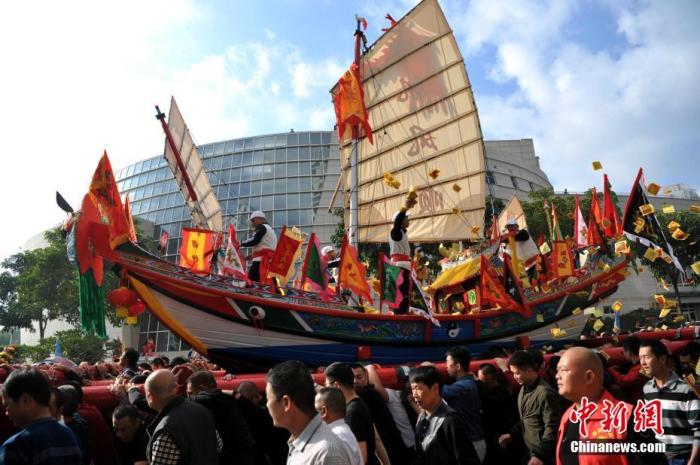China News Service, December 17 (Reporter Ying Ni) The reporter learned from the Ministry of Culture and Tourism that the 15th regular session of the UNESCO Intergovernmental Committee for the Protection of Intangible Cultural Heritage (hereinafter referred to as the "Committee") will be held on December 14, 2020. It will be held online until the 19th.
This regular meeting reviewed 50 intangible cultural heritage items declared by 57 countries.
On the evening of December 17th, Beijing time, my country’s separate declaration of "Tai Chi" and the joint declaration of my country and Malaysia "Send the King Ship-Ceremony and Related Practices Concerning the Sustainable Connection between People and the Ocean" (hereinafter referred to as "Send King Ship" ) Two projects, reviewed and approved by the committee, are included in the UNESCO Representative List of Human Intangible Cultural Heritage.
So far, a total of 42 intangible cultural heritage items in my country have been included in the UNESCO Intangible Cultural Heritage List (book), ranking first in the world.
Data map: Tai Chi enthusiasts practice Tai Chi.
Photo by China News Agency reporter Luo Yunfei
Since its formation in the middle of the 17th century, Tai Chi has been passed on from generation to generation, with practitioners all over the country, and it has been widely spread and passed on overseas.
Taijiquan has no restrictions on the gender, age, physique, occupation, and ethnicity of the practitioners. Through the practice of Taijiquan, people not only cultivate their body and strengthen their bodies, but also inherit the cultural genes of the Chinese nation.
"Learning boxing to make sense", the traditional Chinese philosophy of yin and yang cycle, the harmony between man and nature and the concept of health preservation contained in Taijiquan enrich people's understanding of the laws of the universe, nature, and human body; The basic requirements of respecting teachers, respecting the teacher, not being disrespectful, not mad, not satisfied, etc., subtly cultivate people's peaceful, tolerant, and friendly disposition.
Taijiquan plays an important role in enhancing people's health awareness, promoting physical and mental health, promoting harmonious coexistence among people, and enhancing social cohesion.
The boat to send the king is also called "the boat for burning the king", "the boat for offering sacrifices to the king", and "the king of tribute". It is commonly known as "good deeds". It is a folk ritual for disaster relief and peace. It has a history of more than 600 years. It has been included in the national intangible cultural heritage representative project list.
Photo by China News Agency reporter Zhang Bin
Sending the king ship is a folk activity widely spread in southern Fujian and the coastal areas of Malacca, Malaysia.
Since its formation in the 15th to 17th centuries, with the "Southeast Asia" and maritime trade, it gradually spread from southern Fujian to Southeast Asia.
The ship to the king conveys people’s historical memory of their ancestors going to the ocean, embodies the concept of harmonious coexistence between man and nature and respect for life, and provides rich cultural dialogue resources for promoting the development of an inclusive society; it carries observations of weather, tides, and ocean currents. Such marine knowledge and navigation technology are the crystallization of people's long-term wisdom in marine production and life.
The ship to the king is regarded as a common heritage by the relevant communities in China and Malaysia, and is a vivid example of the spread and integration of Chinese culture in the countries along the Maritime Silk Road.
Actively applying for intangible cultural heritage items to be included in the UNESCO Intangible Cultural Heritage List (volume) is an important part of China’s fulfillment of the responsibilities and obligations of States parties to the Convention for the Protection of Intangible Cultural Heritage. It also fully reflects China’s increasing non-material cultural heritage. The level of protection of the material cultural heritage and the ability to perform the contract are of great significance to the inheritance and promotion of the excellent traditional Chinese culture, the demonstration of the innovative and creative vitality of the Chinese nation, the enhancement of the international influence of the Chinese culture, the promotion of people-to-people bonds and cultural exchanges and mutual learning.

